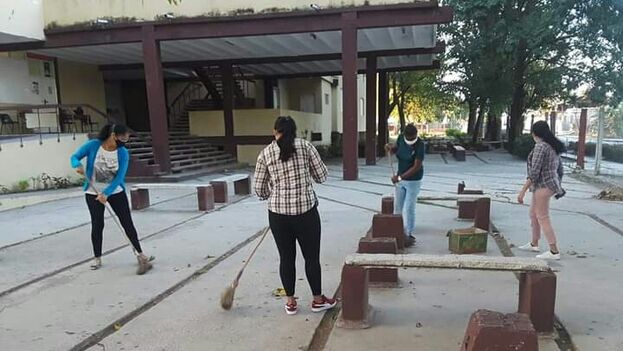
![]() 14ymedio, Natalia López Moya, Havana, 13 January 2023 — State workers in the province of Holguín are experiencing delays in the collection of their monthly salaries. Among the most affected are the employees of Education and Public Health who have not been able to receive their salaries due to lack of cash in the banks, according to testimonies collected by 14ymedio.
14ymedio, Natalia López Moya, Havana, 13 January 2023 — State workers in the province of Holguín are experiencing delays in the collection of their monthly salaries. Among the most affected are the employees of Education and Public Health who have not been able to receive their salaries due to lack of cash in the banks, according to testimonies collected by 14ymedio.
“Several state companies have not been able to get the money,” laments an employee linked to the Ministry of Internal Commerce in the city of Holguín. “When my company’s economics officer contacted the bank, they told him that at the moment the payment cannot be made because they do not have enough cash.”
“This is a very sensitive time of the year because we have just come out of all the Christmas celebrations and people are short,” acknowledges the employee. “People spent what they had and what they did not have to try to guarantee dinner on December 31 and now the news comes that the payments are going to take time. How are we going to hold out until the money arrives?”
Some workers have suggested that their salary be put on their magnetic card, associated with a bank account where the salary is deposited, in order to be able to carry out at least electronic operations such as paying for electricity or others for which it is not necessary to withdraw cash, but the proposal has not received a positive response.
“You cannot pay in cash or with a deposit on the card because in any case if they go to the bank they will not be able to extract that money. We have to wait for the Banco de Crédito y Comercio (Bandec) to notify us that we already have the deposit to start pay the payroll,” emphasizes the accountant of a Credit and Service Cooperative in Holguin, also affected by the lack of money.
According to her account, up to now the civilian workers of the Armed Forces and also of other official dependencies have been able to be paid, but the most serious problems are the personnel of Education and other ministries that have a large volume of workers and who pay them at the same time. “In those sectors, there are those who should have been paid at the end of last year and still haven’t been able to,” she asserts.
Some state workers have had better luck, such as those from Telecristal, the local telecentre, who managed to collect their salaries, but “it was almost a stroke of luck,” admits an employee of the institution who preferred anonymity. “I was able to be paid, but my husband, who works in another company of the Ministry of Agriculture, has been put off for days.”
Some state agencies in the province have been able to access the salaries of their workers, as is the case of Tabacuba, whose payments were made around January 4. The payment dates vary between entities and especially if they are permanent workers, by contract or by agreement.
The lack of cash is not a something new and the Banco de Crédito y Comercio itself was forced to report, half a year ago, that it had run out of Cuban pesos to load into ATMs in some cities in eastern Cuba.
At that time, the Bandec authorities attributed the problem to the lack of high denomination bills and excused themselves, among other reasons, for the “coincidence of salary payments” in almost all the companies in the eastern part of the country.
____________
COLLABORATE WITH OUR WORK: The 14ymedio team is committed to practicing serious journalism that reflects Cuba’s reality in all its depth. Thank you for joining us on this long journey. We invite you to continue supporting us by becoming a member of 14ymedio now. Together we can continue transforming journalism in Cuba.
